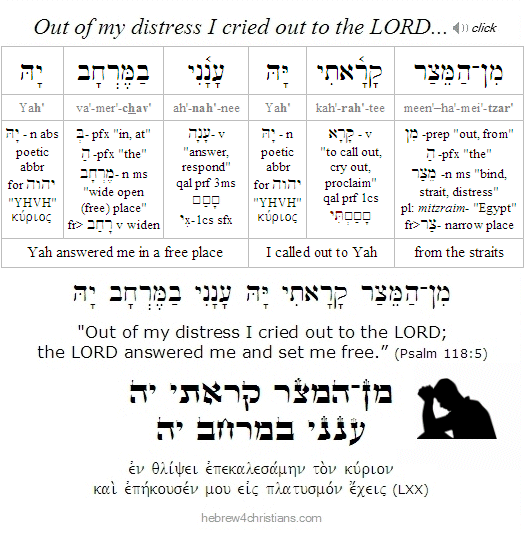|
The name for ancient Egypt in Hebrew is "mitzrayim" (מִצְרַיִם) a word that can be translated as "straits" or "narrow places" (i.e., -מ, "from," and צַר, "narrow"), suggesting that "Egypt" represents a place of constriction, tribulation, oppression, slavery, and despair. The Hebrew word for salvation, on the other hand, is "yeshuah" (יְשׁוּעָה), a word that means deliverance from restriction, that is, freedom and peace. As it is written: "From my distress (מִן־הַמֵּצַר), i.e., from "my Egypt," I cried out to the LORD; the LORD answered me and set me in a wide open place" (Psalm 118:5).
But why, it may be asked, did God tell Jacob: "Do not be afraid to go down to Egypt" (Gen. 46:3)? Why did God allow this excursion into "heavy darkness" that Abraham clearly foresaw (Gen. 15:12-13)? What is there about Egypt that prepares us to take hold of our promised inheritance? Joseph become a prince of Egypt; however, he was still captive to Pharaoh, and later, after he died, a "new Pharaoh arose" that did not acknowledge his contribution to Egyptian history (Exod. 1:8). All that remained of Joseph were his bones – a chest of bones that were carried out by Moses (and later buried by Joshua in Shechem). The "bare bones" of Joseph represented the essence of his faith, as he foresaw the time when God would rescue the family from Egypt and raise him up in the land of promise (Gen. 50:24-26; Heb. 11:22).
A general principle of spiritual life is that the "the way up is the way down" (John 12:24). As Yeshua said, "Whoever would be first among you must be slave of all" (Mark 10:44). Becoming nothing (i.e., ayin) in this world is the condition for seeing something in the world to come. Unless a seed falls to the ground it abides alone (John 12:24). But we become "nothing" by trusting in the promise of God, not by trying to do it ourselves... This is not another venture of the ego. Life in the Spirit means trusting that God will do within you what you cannot do for yourself... We can only take hold of what God has done for us by "letting go" of our own devices (Phil. 2:13). When we let go and trust, we will be transformed, carried by the "Torah of the Spirit of life" (i.e., תּוֹרַת רוּחַ הַחַיִּים, Rom. 8:2), The way is not trying but trusting; not struggling but resting; not clinging to life, but letting go...
God's way of deliverance is entirely different than man's way. Man tries to enlist carnal power in the battle against sin (i.e., religion, politics, etc.), but God's way is to remove the flesh from the equation. The goal is not to make us stronger and stronger, but rather weaker and weaker, until the ego is crucified and only the sufficiency of the Messiah remains. Then we can truly say, "I have been crucified with Messiah. It is no longer I who live, but the Messiah who lives in me. And the life I now live in the flesh I live by faith in the Son of God, who loved me and gave himself for me" (Gal 2:20). The word "Hebrew" (עִבְרִי) means one who has "crossed over" (עָבַר) to the other side, as our father Abraham did when he left the world of Mesopotamia (Gen. 14:13). Likewise it is on the other side of the cross that we experience the very power that created the universe "out of nothing" (i.e., yesh me'ayin: יֵשׁ מֵאַיִן) and that raised Yeshua the Messiah from the dead.
Hebrew Lesson
Psalm 118:5 Hebrew reading (click):
 |
|



